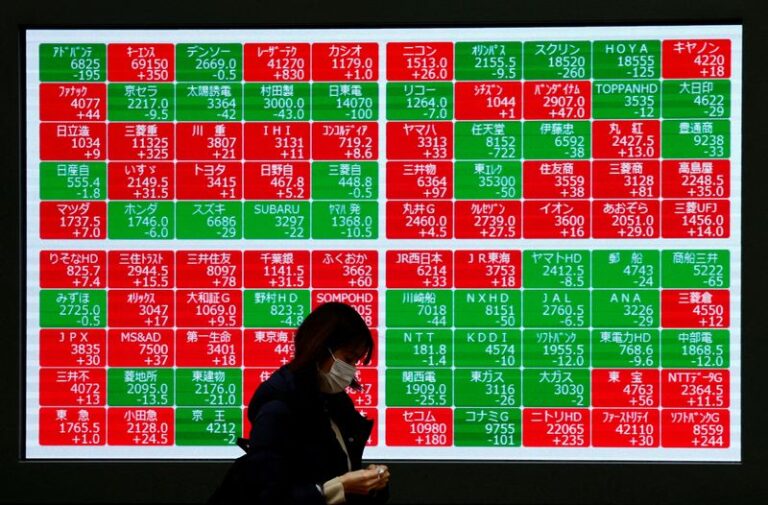By Ray Wee
SINGAPORE (Reuters) – Asian shares fell on Monday after traders sharply downgraded expectations of a Federal Reserve interest rate cut this year as the U.S. labor market remains tight, while the prospect of a general election in France sparked widespread political concerns, weighing on the euro.
Trading was thin in Asia due to public holidays in Australia, China, Hong Kong and Taiwan, but the MSCI composite index of Asia Pacific shares excluding Japan still fell 0.33%.
U.S. stock index futures were up slightly, with S&P 500 futures and Nasdaq futures each rising about 0.03%, reversing small losses in early trade.
The dollar rose again, but U.S. Treasury yields remained high.
The halt in the global risk rally came following Friday’s nonfarm payrolls report, which showed the U.S. economy created many more jobs than expected in May and annual wage growth accelerated again, highlighting the resilience of the labor market.
Futures markets are pricing in about 36 basis points (bps) of Fed rate cuts, down from 50 bps last week, and the likelihood of an easing cycle starting in September is also increasing.
The latest developments come ahead of the Fed’s policy decision on Wednesday, shortly before the release of US inflation data for May.
“It would be very difficult to continue to predict three rate cuts from the Fed this year,” said Rob Carnell, head of Asia Pacific research at ING.
“Many Fed speakers have been talking about the possibility of just one rate cut. Most likely, it will go from three to two, but it could go down to one.”
U.S. Treasury yields also rose on Monday, reflecting expectations that U.S. interest rates will remain high for a long time. [US/]
The two-year Treasury yield and the benchmark 10-year Treasury yield rose about 2 basis points each to 4.8931% and 4.4512%, respectively.
The yen fell more than 0.2% against the dollar to 157.09 yen. The dollar index, which tracks the greenback’s relative value against six major currencies, rose to 105.29 yen.
Japan’s Nikkei stock average rose 0.9%, helped by a weaker yen.
The Bank of Japan (BOJ) is also holding a two-day monetary policy meeting this week where it may provide new guidance on its plans to scale back its large-scale bond purchases.
Sudden general election
Meanwhile in France, President Emmanuel Macron on Sunday declared early parliamentary elections would be held later this month following the country’s crushing defeat in the European Union membership vote to Marine Le Pen’s far-right party.
Macron’s shock decision has sent political shockwaves through France, giving long-sidelined far-right forces a chance to seize real political power and threatening to cripple the president three years before his term ends.
The euro plunged to its lowest in a month following the announcement, last trading 0.5% at $1.0749, amid growing uncertainty over the future political direction of Europe.
Futures also fell, with Euro Stoxx 50 futures down 0.42%, French government bond futures down 0.3%, and FTSE futures down 0.7%.
“Macron’s decision appears to be a calculated risk and comes at a time when a struggle with his parliamentary majority has made it difficult to advance legislation,” said Seea Lee Lim, chief FX and macro strategist for Asia Pacific at Combera.
“We remain bearish (on the euro) in the near term.”
In commodity markets, crude oil prices rose on hopes of increased fuel demand this summer, but the increase was capped by a stronger dollar.
Brent crude futures rose 0.26% to $79.83 a barrel, while US West Texas Intermediate crude futures rose 0.24% to $75.71 a barrel. [O/R]
Spot gold rose 0.13% to $2,295.29 per ounce. [GOL/]
(Editing by Sonali Paul and Sam Holmes)

